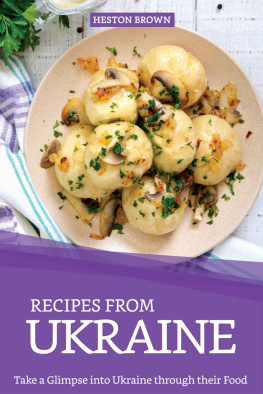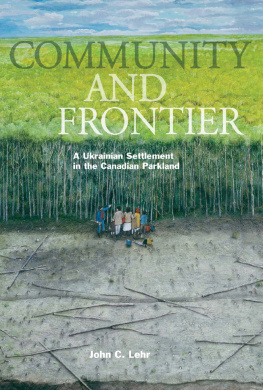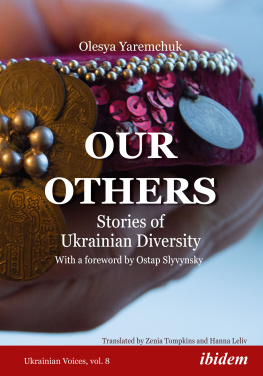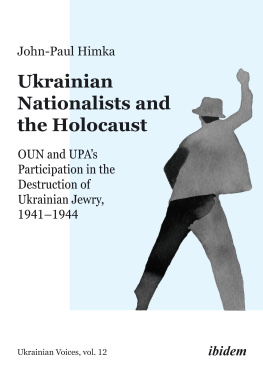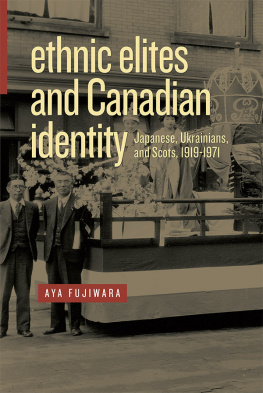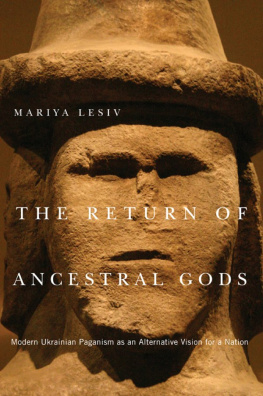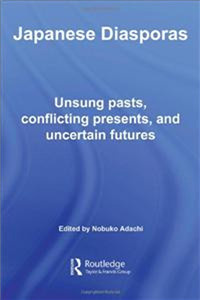
Ukrainian Otherlands
Diaspora, Homeland, and Folk Imagination in the Twentieth Century
Natalia Khanenko-Friesen

The University of Wisconsin Press

The Folklore Studies in a Multicultural World series is a collaborative venture of the University of Illinois Press, the University Press of Mississippi, the University of Wisconsin Press, and the American Folklore Society, made possible by a generous grant from the Andrew W. Mellon Foundation. The series emphasizes the interdisciplinary and international nature of current folklore scholarship, documenting connections between communities and their cultural production. Series volumes highlight aspects of folklore studies such as world folk cultures, folk art and music, foodways, dance, African American and ethnic studies, gender and queer studies, and popular culture.
To
Tim
and
Adrian
Publication of this volume has been made possible, in part, through support from the Andrew W. Mellon Foundation.
The University of Wisconsin Press
1930 Monroe Street, 3rd Floor
Madison, Wisconsin 53711-2059
uwpress.wisc.edu
3 Henrietta Street, Covent Garden
London WC2E 8LU, United Kingdom
eurospanbookstore.com
Copyright 2015
The Board of Regents of the University of Wisconsin System
All rights reserved. Except in the case of brief quotations embedded in critical articles and reviews, no part of this publication may be reproduced, stored in a retrieval system, transmitted in any format or by any meansdigital, electronic, mechanical, photocopying, recording, or otherwise or conveyed via the Internet or a website without written permission of the University of Wisconsin Press. Rights inquiries should be directed to rights@uwpress.wisc.edu.
Printed in the United States of America
Library of Congress Cataloging-in-Publication Data
Khanenko-Friesen, Natalia, author.
Ukrainian otherlands: diaspora, homeland, and folk imagination in the twentieth century / Natalia Khanenko-Friesen.
pages cm (Folklore studies in a multicultural world)
ISBN 978-0-299-30344-0 (pbk.: alk. paper)
ISBN 978-0-299-30343-3 (e-book)
1. Ukrainian diaspora. 2. UkrainiansEthnic identity. 3. UkrainiansCanadaEthnic identity. 4. UkrainiansCanadaFolklore. I. Title. II. Series: Folklore studies in a multicultural world.
DK508.44.K49 2015
909.0491791082dc23
2014040214
Contents
Illustrations
Preface
Many people have been my inspiration and the reason why this book was written. With some, I spent years conversing about the meanings of diaspora and home and the sources of their longing for each other. With others, I contemplated the challenges of stitching together the torn mesh of transatlantic family relations. Some people I only met briefly, but those fleeting encounters proved to be memorable and crucial for my understanding of diaspora-homeland encounters. Fleeting or prolonged, these engagements helped me to craft the arguments presented in this book, and I find myself in debt to each individual for steering me, most often unknowingly, toward better arguments. I also express my gratitude to all the individuals mentioned in the book, either under their real names or pseudonyms, who shared with me their experiences of departure and separation from and longing for their other kin in faraway places.
Several Ukrainian Canadian academics from the University of Alberta were also my inspiration in this work. Bohdan Medwidsky, Andriy Nahachewsky, and Frances Swyripa of the University of Alberta introduced me to the field of Ukrainian Canadian studies in ways more than just academic. Bohdan, I hope this book could offer further answers to that poignant question of what it feels like to live in more than one world. Andriy and Frances, thank you for sharing with me your knowledge of and love for the prairies, a feeling I now share with you.
My words of gratitude also go to those who assisted me in my fieldwork in practical terms, welcomed me into their communities, let me stay in their homes, and made sure I had access to the right people and the right resources while conducting my research. The Bakusko family in Hrytsevolia, Ukraine, put up with me, a stranger in their home, during my two prolonged stays in their house and made me feel like a part of their family. Brenda Prins, Mary Shelast, Marlyn Mandiuk, and Iryna and Bogdan Pyvovarchuk of Mundare, Alberta, Canada, over the course of four years kept taking me into their homes so I could do my work in town without having to commute back to the city or worry about driving back in dangerous conditions in winter. In Edmonton, over the years, Mary and Fred Paranchych became my Canadian family, accommodating me on my return trips to the city for various interviews and archival work. Mary and Fred, thank you for letting me into your life. Olena Husar, head of the Department of the Ukrainian Language at Ternopil National Pedagogical University, generously re-created the feel of home for me when I worked in her city several summers in a row coordinating the study abroad program for Canadian students and pursuing my research at the same time. Thanks to Olena, I met many people in Ukraine who directly contributed to my book. Marta Madych welcomed me to her home on my many trips to Lviv to conduct further interviews for this project. Iryna Hlibovych of Nebyliw, who hosted me in her home having only just met me at the bus stop when I arrived for the first time, was indispensable to my exploration of Nebyliws connections to Canada. On several occasions Bohdan and Lida Struk of Burshtyn, Ukraine, hosted me and took me around their region, including the village of Bili Oslavy so I could conduct further interviews. In the United States, my Harvard colleague Vera Andrushkiv nearly adopted me into her family over the course of several summers that we taught together in the Harvard Ukrainian Research Institute. I spent many days in Veras summer home in the Catskill Mountains in upstate New York, where I had the privilege to experience firsthand the intimate workings of some established Ukrainian American families and their networks. The stories of homecoming you shared with me, Vera, made me appreciate the complexity of these trips in a new light and prompted me to explore this topic further. In Lisbon, Portugal, Teresa Carvalho was keen to introduce me to several Ukrainian migrants working in her fathers estate while also letting me stay in her home in the city. Pavlo Sadokha, Lidia Hall, Nadia Baranovska, and Yuriy Unhurian of Lisbon were most helpful guides and guardians in my explorations of Ukrainian culture of Portugal. In Rome, His Excellency Hlib Lonchyna, Bishop of the Ukrainian Greek Catholic Church and Apostolic Visitor for Ukrainian Catholics in Italy (20032008), ensured I received the best reception in the Ukrainian Greek Catholic community of Rome. The editorial team of Do Svitla, Lida Dukas and Father Vasyl Potochniak, helped me with my earliest explorations of Italian Ukrainian culture, and later Marianna Soronevych, the editor of Italys
Next page

